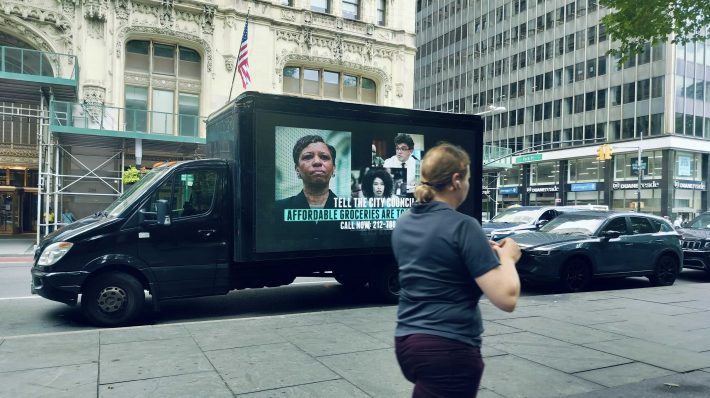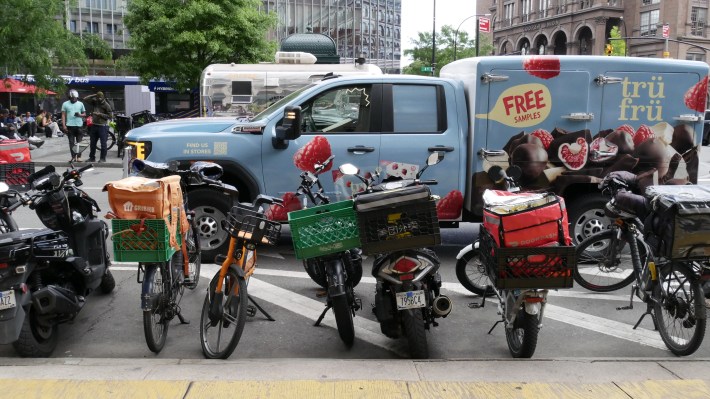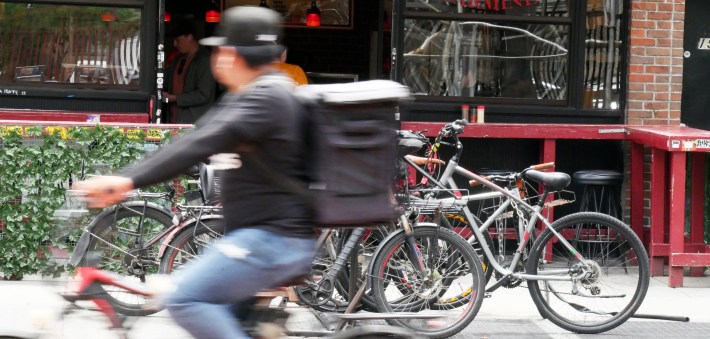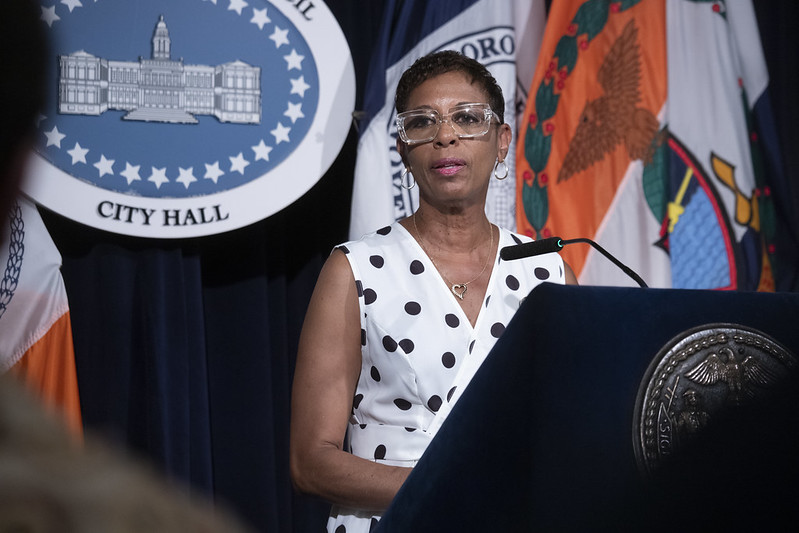City Council Speaker Adrienne Adams promised override the mayor’s controversial last-minute veto of a bill that would close the infamous "Instacart Loophole" and mandate that grocery delivery workers get the same city-mandated minimum pay as restaurant delivery workers.
The Speaker did not mince words when explaining her rationale for thwarting Instacart, the multi-billion-dollar company that successful (at least temporarily) lobbied against the minimum wage bill, Intro 1135. The mayor also vetoed a second worker-protection bill, Intro 1133, at the same time on Wednesday night.
“The mayor's vetoes are anti-worker and anti-working class. ... The hypocrisy of his claims are on full display for all to see,” Speaker Adams told reporters on Thursday, citing Streetsblog's coverage. “Despite [Instacart’s] efforts to deceive the public, these bills do not increase the cost of groceries. Any added fees are about padding [Instacart’s] own profits, be not deceived.”

The two bills will expand the restaurant delivery worker minimum pay rate to include all gig-economy delivery workers, no matter what they are picking up and dropping off. The bills passed in July with enough Council support to override the mayor’s veto. But that override effort would be in jeopardy if Instacart picks off a few votes in the coming month before the vote.
With his recent vetoes, Mayor Adams is facilitating the exploitation of grocery delivery workers in our city. It is disgraceful. Now and always, @council.nyc.gov will continue to stand up for workers in our city and fight for the equity they deserve.
— Adrienne Adams (@nycspeakeradams.bsky.social) 2025-08-14T20:33:14.648Z
The mayor parroted Instacart’s lobbying materials in his veto statement on Wednesday night.
“Grocery prices are already too high, so now is not the right time to do anything to drive these prices even higher," he said. "[The bills] would do just that at a time when too many working-class New Yorkers are struggling."
Hizzoner's argument was almost verbatim from materials provided by the Instacart-funded Astro-turf group "New Yorkers For Affordable Groceries," which opposes expanding labor protections and pay standards to the almost 20,000 workers who were left out of the delivery worker minimum wage law in 2019.
The mayor and Instacart’s arguments don't carry any water, said researchers in labor and food justice.

“Denying one group of app based delivery workers a minimum pay because the stuff that they're delivering changes from pad thai to pantry staples … that's not how New York should tackle affordability,” said Nevin Cohen, the director of the CUNY Urban Food Policy Institute and a professor at the CUNY’s school of public health. “And if we accept that logic and why not pay construction crews minimum wage or less to build affordable housing to keep the rents lower? We don't do that in New York. We don't use underpaying people as a strategy for keeping prices low.”
If the mayor wants to tackle the problem of grocery affordability, which is real, there are other things he can do, Cohen added, such as expanding the "Health Bucks" program and others that connect high-need residents to affordable fresh produce. There’s also a program called “Groceries Go” that helps residents with chronic health conditions afford the cost of grocery delivery by allowing them to order items through Mercato, another grocery delivery company, using a stipend.
“In my mind, fair pay for delivery workers doesn't conflict with food access,” Cohen said.

Ruth Milkman, a professor of sociology at CUNY, added New York has always had grocery delivery, long before these apps existed, but "the difference now is that Instacart gets a cut of the money."
"Affordability is an issue for everybody who works, not just for people who go food shopping. And if people don't want to pay the premium, they can go buy their own groceries," said Milkman, who studied the grocery delivery industry in 2019.
The mayor's two vetoes join a third recent rejection of a bill decriminalizing unlicensed street vending — all of which contradicted the administration's own recommendations for worker pay.
"Major parts of these bills were recommended by the mayor's own report," the Speaker said, referring to 2022 white paper, "Blueprint for Economic Recovery." "His administration testified in support and enthusiastically commended the Council for advancing them. Why are we here?"
Instacart had previously threatened to sue if Intro 1135 becomes law, as it is expected to do after the Council overrides next month. Stay tuned.






